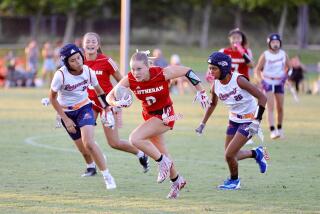Transfer Rule Could Undergo Strict Changes
The Southern Section is expected to adopt a proposal that will prohibit students who transfer schools without moving from participating in varsity sports for one year.
The legislation is up for a vote before the section council Thursday, during a meeting of 83 league representatives and athletic officials in Long Beach. If approved, it will go into effect in the 2003-2004 school year.
Students who transfer would still be eligible to compete at levels below varsity and in sports they haven’t previously played in high school.
Similar rules already are in effect in the Marmonte, Mission and Pacific View leagues. The Pacific View rule is the most strict, barring transfers from competing in sports at any level.
“We might finally reach closure on this transfer thing,” said West Hills Chaminade Principal Gary Murphy, who represents the Mission League and is a proponent of the initiative. “Even if it doesn’t pass, it’s elevated dialogue, but judging from the reaction I’ve gotten from principals, people are ready for a change.”
Nearly 3,800 students transferred in the 529-school section from the fall of 1999 through December of last year, a figure that does not include students who transferred because of a change in residence.
The section initiative would complement a proposal being considered by the California Interscholastic Federation, which governs competition for the state’s 1,292 high schools.
At meetings May 3-4, the CIF will vote on a rule requiring school officials to certify that no one connected with their booster clubs or athletic programs had contact with transfers. If approved, it will go into effect for the 2002-2003 school year on a two-year trial basis.
After the transfer window is slammed shut, some administrators are saying that material advantages that entice athletes to change schools should be the next topic tackled.
Recent newspaper accounts of the partnerships between shoe companies and some high school basketball teams have scholastic lawmakers considering additional legislation.
Nike and Adidas sponsor about 200 high school basketball teams, including 15 in the Southland. Most receive two pairs of basketball shoes, an athletic bag and a T-shirt for each player, but selected teams like Westchester and Santa Ana Mater Dei last season were fully outfitted by Nike for free. For example, each Westchester player received more than $1,300 in gear, including five pairs of shoes, and the team had its trip to a prestigious tournament paid for by a Nike affiliate.
“As a principal, it abhors me to think there is an outside agency that could have control over financing something on my campus,” said Norwalk Principal Frank Zepeda, who represents the Suburban League on the section council. “We would join anybody making a move to oust something like that.”
Section Commissioner James Staunton said he was bothered by the “selectivity” of schools targeted by shoe companies because of their gaudy records. He is in favor of curbing the power of sneaker giants.
“The way I would see it going would be possibly to limit these services,” Staunton said. “If Nike pays for kids to go to a tournament, there would be some reasonable limit that they couldn’t send them to the Ritz-Carlton or feed them on $150 a day [per person].”
Such donations are legal, although a state bylaw stipulates that teams are supposed to report single-source donations of more than $500 to a school administrative source, most often the principal or an athletic director.
“The school that receives all these things, kids will want to go there,” Covina Principal Karl Major said. “Corporate sponsorship is sneaking into individual high schools and it’s ridiculous. I guess I just don’t understand high school sports anymore. They’re losing their real value.”
Peter J. Saco, commissioner of the Sac-Joaquin Section, the second largest CIF section, said that sneaker-sponsored teams “maybe shouldn’t be in our playoffs.”
“They shouldn’t be competing against schools in suburban L.A. or Ontario that are just trying to make ends meet,” Saco said. “It’s a little extreme, but maybe these people have created such an unlevel playing field that they play in the regular season and in these [elite] tournaments and then that’s it.
“How can [shoe-company sponsorship] possibly be a good thing for high school sports when only certain schools are benefiting from it? The rich get richer and everybody else tries to survive. It leads to school shopping and recruiting. The better seventh- and eighth-graders are going to funnel to these schools. That’s not the philosophy we want.”
Some administrators favor limiting sponsors rather than outlawing them. Or encouraging deep-pocket sponsors to more broadly share the wealth.
“All kids, regardless of where they’re at, should be treated equally,” said Jeff Schwartz, a former basketball coach who is in his fifth year as principal at Montebello. “One solution is that they’re just not able to do it. The other option is that they can make a donation to each school’s athletic program, with the condition that they get to sponsor some schools a little bit more.”
San Clemente Principal Chuck Hinman said he has trouble differentiating between big athletic-apparel sponsorships and those from smaller businesses.
“Are you going to tell Sonny’s Pizza they can’t [sponsor a high school team]? That you can’t take a $5,000 check they are giving you that is going directly to uniforms?” Hinman said.
“The district is going to provide a Volkswagen. But if you’re going to drive a Cadillac, you need funding from alternative sources. We’re going to give you jerseys, five or six basketballs and a place to play. If you want more, then the coach has to go out and find that sponsor.”
Mater Dei Principal Patrick Murphy said the agreement between Nike and his school should be congratulated, not criticized.
“As a school that does not get government aid, it’s incumbent upon us to find corporate sponsorships in many different ways,” said Murphy, who represents the Serra League on the Southern Section council. “If you work hard to develop sponsorships and corporate relationships, you should be rewarded for that.”
More to Read
Get our high school sports newsletter
Prep Rally is devoted to the SoCal high school sports experience, bringing you scores, stories and a behind-the-scenes look at what makes prep sports so popular.
You may occasionally receive promotional content from the Los Angeles Times.







